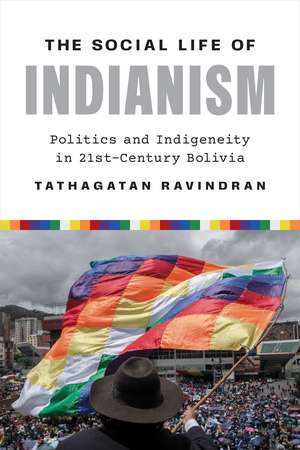The Social Life of Indianism: Politics and Indigeneity in Twenty-First-Century Bolivia
Autor Tathagatan Ravindranen Limba Engleză Paperback – 10 iun 2025
When the political ideology known as “Indianism” developed in Bolivia in the 1960s, it was premised on a rejection of Bolivian nationalism. Over the ensuing decades, however, it underwent several mutations as it moved out of a close circle of intellectuals to grip the urban masses that brought Evo Morales—the first Indigenous president—to power in 2006.
The Social Life of Indianism offers a fresh perspective by examining Bolivian Indigenous politics through the lens of political ideology. Through an ethnographic study of Indianism in the city of El Alto, Tathagatan Ravindran shows how canonical Indianism—the original ideology that rejects Bolivia as enslaver of the Indian nation—provided philosophical ballast for exponents of a more popular folk Indianism that accommodates the Bolivian state and pursues Indigenous empowerment within it. Synthesizing approaches from several disciplines, Ravindran demonstrates how canonical Indianism was not refuted or supplanted; it refracted, in the broader public, into a new common sense. A sophisticated analysis of a complex political landscape, The Social Life of Indianism brings much-needed nuance to one of the most prominent forms of Indigenous ideology and offers a unique framework for analyzing political ideologies across the contemporary world.
Preț: 216.43 lei
Nou
Puncte Express: 325
Preț estimativ în valută:
41.42€ • 42.100$ • 34.54£
41.42€ • 42.100$ • 34.54£
Carte nepublicată încă
Doresc să fiu notificat când acest titlu va fi disponibil:
Se trimite...
Preluare comenzi: 021 569.72.76
Specificații
ISBN-13: 9781477331200
ISBN-10: 1477331204
Pagini: 312
Ilustrații: 7 b&w illustrations
Dimensiuni: 152 x 229 mm
Greutate: 0.45 kg
Editura: University of Texas Press
Colecția University of Texas Press
ISBN-10: 1477331204
Pagini: 312
Ilustrații: 7 b&w illustrations
Dimensiuni: 152 x 229 mm
Greutate: 0.45 kg
Editura: University of Texas Press
Colecția University of Texas Press
Notă biografică
Tathagatan Ravindran is an anthropologist working on social movements, political identities, indigeneity, and race/ethnicity in Latin America. He is the director of Epistemological Justice and the Laboratory of Data at Baobab: Centro de Inovación en Justicia Étnicoracial, de Género y Ambiental in Cali, Colombia.
Cuprins
- List of Abbreviations
- Introduction
- Chapter 1. Calling for Indian Revolution: The Birth and Maturation of Indianist Ideology
- Chapter 2. Toward a New Common Sense: Indigenous Counterpublics and the Diffusion of Indianism
- Interlude 1. ¡Evo presidente!
- Chapter 3. A Journey without Guarantees: Ideological Refractions and the Emergence of Folk Indianism
- Chapter 4. “We Cannot Forget Our Roots!”: Ethnoracial Identities in Indianist Bolivia
- Chapter 5. When Folk Ideology Feeds Back into the Canon: Indianist Praxis between Revival and Refusal
- Chapter 6. Across the Wide Spectrum: Indianist Logics in State and Social Movement Discourses
- Interlude 2. The 2019 Coup and Its Aftermath
- Chapter 7. The Rebellion of the Wiphalas: Racist Backlash and the Radicalization of Folk Indianism
- Conclusion
- Acknowledgments
- Notes
- References
- Index
Recenzii
Ravindran shows how early Indigenous intellectuals contested dominant narratives of Bolivian mestizaje, producing an alternative ideology, Indianism, that highlighted the centrality of race in Andean society and called for Indian nationalism. In the last decades, as urban Indigenous activists mobilized politically and created counterpublics, these elements refracted into a hybrid “folk ideology” that led to a transformation of political consciousness and new commonsense understandings of indigeneity. Set in the turbulent 2000s in Bolivia’s “rebel city," El Alto, this remarkable book shows how ideologies take form in everyday life, providing tools for use in the struggle against structural racism.
An up-close-and-personal portrait of the politics of Indigenous cultural revival in contemporary Bolivia that shows how diverse political perspectives can emerge within a community of ideologically committed thinkers. Ravindran’s approach of following Indianismo from the sidewalks to political publications and into living room discussions among self-identified Indianist activists and theorists is incredibly effective and rewarding. Most significantly, this text examines the ways that rural-to-urban migration and racialized experience in cities and public life shaped a new political perspective that is grounded in Indianism but looks beyond it.
Descriere
A sophisticated analysis of an influential Indigenous political ideology.
